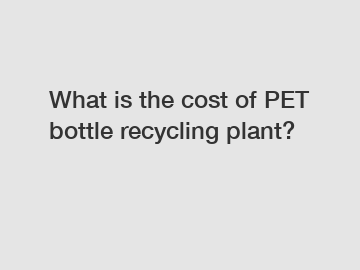What is the cost of PET bottle recycling plant?
In recent times, environmental consciousness has soared, leading individuals and businesses alike to seek sustainable solutions to societal challenges. With the global plastic problem reaching alarming levels, PET bottle recycling has emerged as a pivotal step towards a greener future. However, one query often lingers in the minds of those considering investing in such a venture: "What is the cost of setting up a PET bottle recycling plant?" In this article, we will delve into the intricacies of this question and provide you with a comprehensive analysis of the expenses involved.
Understanding the Current State of Recycling:
Before we delve into the financials, it is essential to recognize the long-term benefits and significance of establishing a PET bottle recycling plant. Currently, only a fraction of the millions of PET bottles produced annually are recycled worldwide. This has resulted in widespread pollution and a glaring need for recycling infrastructure. By investing in a PET bottle recycling plant, you not only contribute to combating pollution but also tap into a profitable market with growing demand for recycled materials.

The Cost Factors:
1. Plant Capacity and Technology:
The cost of setting up a PET bottle recycling plant depends heavily on its intended capacity. Smaller plants designed to handle around 1 to 5 tons of bottles per day may require an initial investment of $500,000 to $1 million. For larger-scale operations handling over 20 tons of bottles daily, the cost can range from $2 million to $10 million or more.
2. Machinery and Equipment:
The core machinery necessary for a PET bottle recycling plant includes sorting systems, shredders, granulators, washing equipment, and extruders. These equipment costs may vary based on the plant's capacity, desired end products, and efficiency. On average, budgeting around $500,000 to $1 million for machinery and equipment is a good starting point.
3. Facility and Infrastructure:
A suitable location is vital for a successful recycling plant. Factors such as proximity to raw material sources, waste management regulations, access to utilities such as water and electricity, and transportation logistics significantly impact the overall costs. Lease or purchase costs for a suitable facility can range from $500,000 to $2 million or higher.
4. Regulatory Compliance and Licensing:
Ensuring compliance with environmental regulations, obtaining necessary permits and licenses, and meeting safety standards constitute essential costs that must be factored into the overall expenses. Consultancy fees and legal expenses can amount to $100,000 to $200,000 during the initial phases.
5. Workforce and Staff Training:
A competent and trained workforce is fundamental for the smooth operation of any recycling plant. Hiring skilled technicians, maintenance personnel, and quality control professionals, and providing adequate training and safety measures may incur costs ranging from $200,000 to $500,000 per year.
6. Marketing and Operational Costs:
To establish a customer base and promote your recycled products, marketing and branding efforts are necessary. Additionally, operational costs, including utilities, maintenance, raw material sourcing, and transportation, should also be considered. Budgeting an annual expenditure of $500,000 to $1 million is advisable.
Conclusion:
The cost of setting up a PET bottle recycling plant varies based on factors such as plant capacity, technology, location, machinery, regulatory compliance, and operational essentials. While the initial investment may seem substantial, it is crucial to view it as a long-term commitment towards environmental sustainability and business opportunity. Moreover, financial support options and incentives offered by governments and organizations further help alleviate the financial burden.
Remember, embarking on this impactful journey requires careful planning, market research, and collaboration with industry experts. By investing in a PET bottle recycling plant, you embrace a sustainable business model while making a substantial contribution to tackling the plastic waste crisis. Together, we can foster a greener, cleaner, and more sustainable future for generations to come.
If you want to learn more, please visit our website rPET pellets, rPET pellets, rPET pellets.


